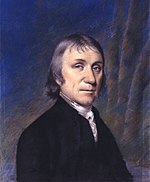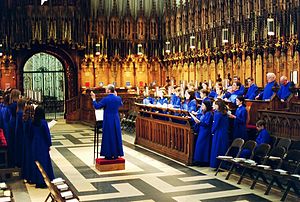Portal:Yorkshire
The Yorkshire Portal
Yorkshire (/ˈjɔːrkʃər, -ʃɪər/ YORK-shər, -sheer) is an area of Northern England which was historically a county. Despite no longer being used for administration, Yorkshire retains a strong regional identity. The county was named after its original county town, the city of York.
The south-west of Yorkshire is densely populated, and includes the cities of Leeds, Sheffield, Bradford, Doncaster and Wakefield. The north and east of the county are more sparsely populated, however the north-east includes the southern part of the Teesside conurbation, and the port city of Kingston upon Hull is located in the south-east. York is located near the centre of the county. Yorkshire has a coastline to the North Sea to the east. The North York Moors occupy the north-east of the county, and the centre contains the Vale of Mowbray in the north and the Vale of York in the south. The west contains part of the Pennines, which form the Yorkshire Dales in the north-west. (Full article...)
Selected article

Set and filmed in Holmfirth, West Yorkshire, England, the plot centres around a trio of older men, the lineup of whom has changed over the years, but originally consisted of the scruffy and child-like Compo, deep-thinking and meek Clegg, and authoritarian and snobbish Blamire, who was replaced by war veteran Foggy after two series in 1976. The three never seem to grow up, revelling in youthful stunts, and always finding a unique perspective on their equally eccentric fellow townspeople. (read more . . . )
Selected image
Selected biography

During his lifetime, Priestley's considerable scientific reputation rested on his invention of soda water, his writings on electricity, and his discovery of several "airs" (gases), the most famous being what Priestley dubbed "dephlogisticated air" (oxygen). However, Priestley's determination to reject what would become the chemical revolution and to cling to phlogiston theory eventually left him isolated within the scientific community.
Priestley's science was integral to his theology, and he consistently tried to fuse Enlightenment rationalism with Christian theism. In his metaphysical texts, Priestley attempted to combine theism, materialism, and determinism, a project that has been called "audacious and original". He believed that a proper understanding of the natural world would promote human progress and eventually bring about the Christian Millennium. Priestley, who strongly believed in the free and open exchange of ideas, advocated toleration and equal rights for religious Dissenters, which also led him to help found Unitarianism. (read more . . . )
Selected list -

Hull City Association Football Club, an English association football club based in Kingston upon Hull, East Riding of Yorkshire, was founded in 1904. The team's first competitive matches came in the FA Cup, being beaten 4–1 by Stockton in a replay following a 3–3 draw, before they were elected to the Football League Second Division ahead of the 1905–06 season. Hull missed out on promotion in the 1909–10 season, having an inferior goal average to Oldham Athletic and finishing in third. The 1929–30 season saw Hull relegated to the Third Division North after 21 seasons in the Second Division while reaching the semi-final of the FA Cup, where they were beaten by Arsenal after a replay. Promotion back to the Second Division was achieved three years later, with the Third Division North championship becoming the club's first major honour. However, they were relegated in the 1935–36 season and it was 13 years before another return to the Second Division was made, when, under the player-management of former England international Raich Carter, the Third Division North title was won. Relegation back to this division came in the 1955–56 season and following League reorganisation implemented for the 1958–59 season Hull won promotion in the Third Division's inaugural season, although they were relegated after one year.
The Third Division championship was won in the 1965–66 season and Hull remained in the Second Division for 12 years before relegation in 1978. Hull reached the semi-final of the Watney Cup in the tournament's inaugural staging in 1970, where they were beaten by Manchester United in a penalty shoot-out; this was the first game in English football to be decided by this method. The Final of this competition was reached in 1974, where Hull were beaten by Stoke City. Relegation to the Fourth Division for the first time in the club's history came in 1981 and a return to the Third Division was secured two years later in the 1982–83 season. The season after, Hull reached the final of the Associate Members' Cup in its inaugural season and were beaten by AFC Bournemouth. Promotion to the Second Division came the following season, although relegations in the 1990–91 and 1995–96 seasons saw the club return to the fourth tier.Hull's first play-off campaign ended unsuccessfully, being beaten by Leyton Orient in the semi-final in the 2000–01 season. However, successive promotions in the 2003–04 and 2004–05 seasons saw Hull rise from the fourth tier to the second tier in a space of two years. After 104 years of existence, Hull were promoted to the Premier League for the first time in their history, beating Watford in the play-off semi-finals and Bristol City in the 2008 Football League Championship play-off final. Hull's first Premier League season saw safety from relegation ensured on the last day of the season, although the club was relegated the following season after finishing 19th in the league. Three years later, Hull returned to the Premier League after finishing the 2012–13 season as Championship runners-up. In the 2013–14 season they achieved their highest ever league finish of 16th and were runners-up to Arsenal in their first ever FA Cup Final appearance. Since then, they have been relegated to the Championship and promoted again. (Full article...)Selected Did You Know . . .

- ... that St. Oswald's church, Oswaldkirk (pictured), hosted the first sermon of the future Archbishop of Canterbury and chaplain to Charles II, John Tillotson?
- ... that York City have recorded more league victories against Rochdale than against any other club, having beaten them 43 times from 100 attempts?
- ... that Blair Athol won the 1864 Derby despite getting repeatedly kicked in the genitals by a lad paid by bookmakers to prevent him from competing, and later sired Silvio, who also won the Derby in 1877?
General images -
Subcategories
Selected panorama

Topics
Related portals
WikiProjects
Things you can do
Associated Wikimedia
The following Wikimedia Foundation sister projects provide more on this subject:
-
Commons
Free media repository -
Wikibooks
Free textbooks and manuals -
Wikidata
Free knowledge base -
Wikinews
Free-content news -
Wikiquote
Collection of quotations -
Wikisource
Free-content library -
Wikiversity
Free learning tools -
Wikivoyage
Free travel guide -
Wiktionary
Dictionary and thesaurus
Text is available under the CC BY-SA 4.0 license; additional terms may apply.
Images, videos and audio are available under their respective licenses.




















































